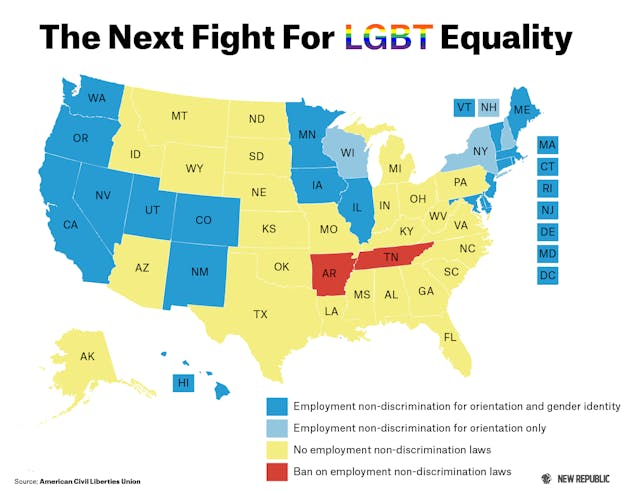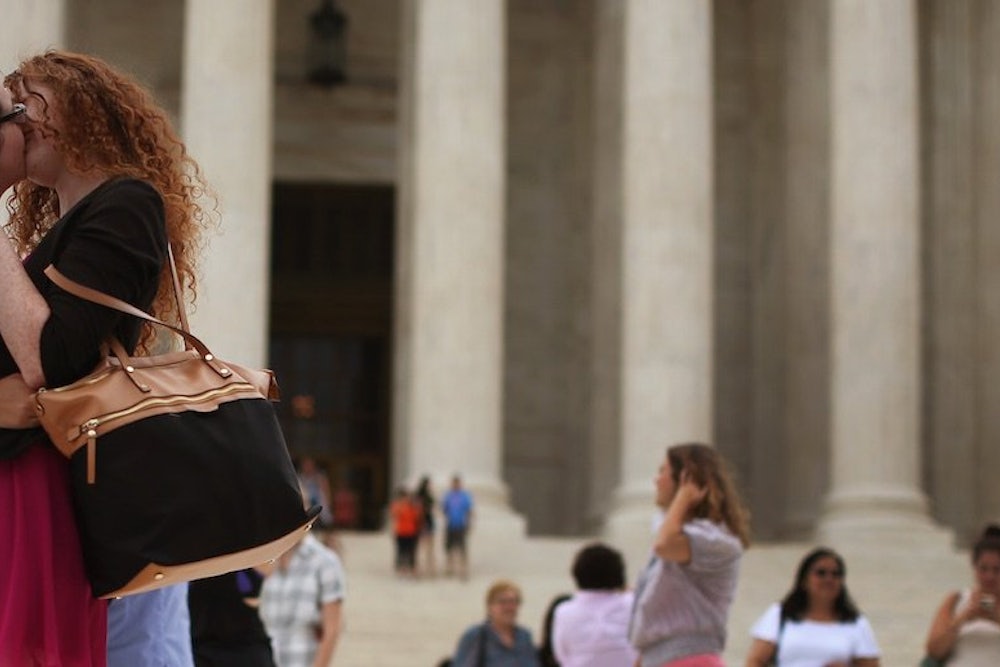The Supreme Court's ruling Friday that gay couples have a constitutional right to marry is undoubtedly a historic victory for the LGBT rights movement. But marriage equality is not the same as full equality. As Adam Talbot of the Human Rights Campaign (HRC) puts it: “[Gays] can get married at 10, post those photos on Facebook, their boss can fire them at noon on the basis of their sexual orientation, and at 2 PM, their landlord can evict them.”
That, most likely, is the movement's next big fight: Most states don't prohibit workplace and housing discrimination against LGBT people.
Securing non-discrimination protections has always been a priority, of course. “The fight for marriage has been a tremendous one," said Gabriel Balu, executive director of the Family Equality Council. "It's had its ups and downs and it's taken a lot of energy and a lot of work, but all along the way, marriage has not been the only issue.” But now that the marriage equality battle has been won, LGBT rights organizations can reallocate resources for other battles. “Making progress in one area of our fight, like passing marriage equality, puts pressure to make sure LGBTQ people have nondiscrimination protection," said Talbot, HRC's deputy communications director. "The interactivity of these issues leads to support for equality across the board.”

There a few ways the movement can—and plans to—“move from a patchwork to full comprehensive protections nationwide,” said Rea Carey, executive director of the National LGBTQ Task Force. Many states and municipalities are already crafting their own nondiscrimination legislation. The “Utah compromise” in March, for example, serves as a model for how conservative states can enact equal protection laws that make the majority of its constituents happy. But waiting for local and state-level governments to take action can be slow and disappointing; many states aren’t even close to prioritizing equal protections for LGBT people—and some are actively trying to curtail those rights. “The situation now is you may have your home in one town and drive to another town for work and lose those protections,” Carey said.
Which is why many national LGBT advocacy groups have set their sights on federal nondiscrimination protections. Talbot says the organization supports state-level and local protections, but sees federal protection as a next top priority for the movement. Ian Thompson, a legislative representative at the ACLU, told me that many are keeping an eye on an amendment that Senator Al Franken plans to introduce when Congress is back in session. According to Franken's office, the senator plans to introduce his student non-discrimination bill as an amendment to a large education overhaul that would prohibit discrimination on the basis of gender identity or sexual orientation in public schools. Thompson said Franken’s amendment could help LGBT advocates gauge support in Congress for a broader nondiscrimination bill.
Of course, there's another way nondiscrimination protections could become nationwide law: through the Supreme Court.
“I’m sure that there will be very important and consequential upcoming cases dealing with protections for the LGBTQ community in the courts," Thompson said. "But my focus is on pushing the passage of this in Congress.”
It won't be easy. The federal Employment Non-Discrimination Act has been introduced in almost every Congress over the past twenty years.
